
Akinwande Oluwole Babatunde Soyinka Hon. FRSL, known as Wole Soyinka, is a Nigerian playwright, novelist, poet, and essayist in the English language. He was awarded the 1986 Nobel Prize in Literature for "in a wide cultural perspective and with poetic overtones fashioning the drama of existence", the first sub-Saharan African to be honoured in that category.
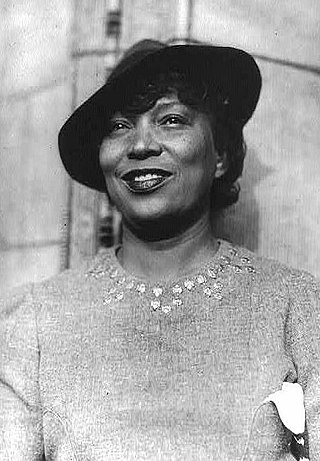
Zora Neale Hurston was an American author, anthropologist, and documentary filmmaker. She portrayed racial struggles in the early-20th-century American South and published research on hoodoo. The most popular of her four novels is Their Eyes Were Watching God, published in 1937. She also wrote over 50 short stories, plays, and essays.

Alice Malsenior Tallulah-Kate Walker is an American novelist, short story writer, poet, and social activist. In 1982, she became the first African American woman to win the Pulitzer Prize for Fiction, which she was awarded for her novel The Color Purple. Over the span of her career, Walker has published seventeen novels and short story collections, twelve non-fiction works, and collections of essays and poetry.
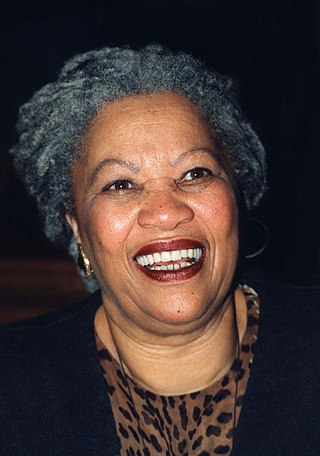
Chloe Anthony Wofford Morrison, known as Toni Morrison, was an American novelist and editor. Her first novel, The Bluest Eye, was published in 1970. The critically acclaimed Song of Solomon (1977) brought her national attention and won the National Book Critics Circle Award. In 1988, Morrison won the Pulitzer Prize for Beloved (1987); she was awarded the Nobel Prize in Literature in 1993.

Erzulie is a family of loa, or spirits, in Vodou.

Paolo Caliari, known as Paolo Veronese, was an Italian Renaissance painter based in Venice, known for extremely large history paintings of religion and mythology, such as The Wedding at Cana (1563) and The Feast in the House of Levi (1573). Included with Titian, a generation older, and Tintoretto, a decade senior, Veronese is one of the "great trio that dominated Venetian painting of the cinquecento" and the Late Renaissance in the 16th century. Known as a supreme colorist, and after an early period with Mannerism, Paolo Veronese developed a naturalist style of painting, influenced by Titian.

Zadie Smith FRSL is an English novelist, essayist, and short-story writer. Her debut novel, White Teeth (2000), immediately became a best-seller and won a number of awards. She became a tenured professor in the Creative Writing faculty of New York University in September 2010.

Èzili Dantò or Erzulie Dantor is the main loa or senior spirit of the Petro family in Haitian Vodou. Ezili Danto, or Èzili Dantò, is the "manifestation of Erzulie, the divinity of love,". It is said that Ezili Danto has a dark complexion and is maternal in nature. The Ezili are feminine spirits in Haitian Vodou that personify womanhood. The Erzulie is a goddess, spirit, or loa of love in Haitian Voudou. She has several manifestations or incarnations, but most prominent and well-known manifestations are Lasirenn, Erzulie Freda, and Erzulie Dantor. There are spelling variations of Erzulie, the other being Ezili. They are English interpretations of a Creole word, but do not differ in meaning.

Cyril Vernon Connolly CBE was an English literary critic and writer. He was the editor of the influential literary magazine Horizon (1940–49) and wrote Enemies of Promise (1938), which combined literary criticism with an autobiographical exploration of why he failed to become the successful author of fiction that he had aspired to be in his youth.

Jonathan Kozol is an American writer, progressive activist, and educator, best known for his books on public education in the United States.

Edwidge Danticat is a Haitian-American novelist and short story writer. Her first novel, Breath, Eyes, Memory, was published in 1994 and went on to become an Oprah's Book Club selection. Danticat has since written or edited several books and has been the recipient of many awards and honors. As of the fall of 2023, she will be the Wun Tsun Tam Mellon Professor of the Humanities in the department of African American and African Diaspora Studies at Columbia University.

Geraldine Brooks is an Australian-American journalist and novelist whose 2005 novel March won the Pulitzer Prize for Fiction.

Howards End is a novel by E. M. Forster, first published in 1910, about social conventions, codes of conduct and relationships in turn-of-the-century England. Howards End is considered by many to be Forster's masterpiece. The book was conceived in June 1908 and worked on throughout the following year; it was completed in July 1910.
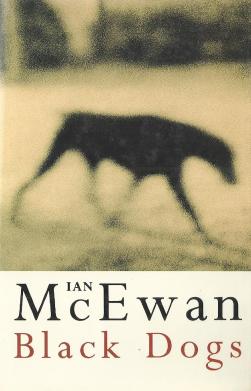
Black Dogs is a 1992 novel by the British author Ian McEwan. It concerns the aftermath of the Nazi era in Europe, and how the fall of the Berlin Wall in the late 1980s affected those who once saw Communism as a way forward for society. The main characters travel to France, where they encounter disturbing residues of Nazism still at large in the French countryside. Critical reception was polarized.
Lenelle Moïse is a poet, actress and playwright born in Port-au-Prince, Haiti. Currently based in the United States, she performs at colleges throughout the country, presenting work about race, gender, class, immigration and sexuality. Her spoken word CD Madivinez won the 2007 Patchwork Majority Radio Album Award for Best Solo Album. Moïse was a member of the permanent ensemble cast in the Culture Project's premiere production of Rebel Voices, a play by Rob Urbinati based on Howard Zinn and Anthony Arnove's book Voices of a People's History of the United States. In 2008, she developed a two-person vocal musical about art, infamy and race called EXPATRIATE, also at the Culture Project, in which she co-starred with Karla Cheatham-Mosley. When she was a junior at Ithaca College, Lenelle co-wrote Sexual Dependency, a feature film by Bolivian filmmaker Rodrigo Bellot who was a schoolmate at the time. The film went on to win the International Film Critics' Award at the Locarno International Film Festival in Switzerland. Moïse also wrote and starred in Mara Alper's short experimental video "To Erzulie" which premiered at the Berlin Sommerfest der Literaturen in July 2002. She has completed her own experimental shorts "Blue Passersby Eyes" and "Atlantic Soul." Her homemade music video Pied Piper was an official selection of the International Museum of Women 2007 Online Film Festival. Her essays and poems are published in a number of anthologies, most recently Word Warriors: 35 Women Leaders of the Spoken Word Revolution. Her debut book Haiti Glass, part of the Sister Spit series, is a collection of verse and prose. She experiments with collage as a form of meditative practice and nonlinear storytelling.
Carlene Davis is a Jamaican gospel and reggae singer active since the 1970s. Successful since the early 1980s as a reggae artist, she survived cancer in the mid-1990s, after which she dedicated her career to gospel music. She has released over ten albums.
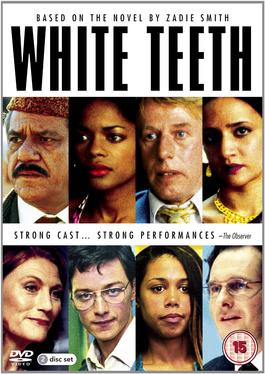
White Teeth is a 2002 British four-part drama TV serial based on the 2000 novel of the same name written by Zadie Smith.
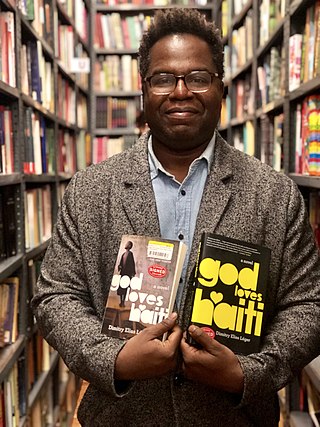
Dimitry Elias Léger is a Haitian-American novelist, journalist, and humanitarian. Léger is best known for the acclaimed novel God Loves Haiti (2015), which the New York Times praised as "a powerful portrait of a nation in peril and the citizens who inhabit it." His writing has appeared in many magazines and newspapers. Since 2010, he has worked as a communications advisor at the United Nations around the world, including in Haiti, Switzerland, and Mali.

Namwali Serpell is an American and Zambian writer who teaches in the United States. In April 2014, she was named on Hay Festival's Africa39 list of 39 sub-Saharan African writers aged under 40 with the potential and talent to define trends in African literature. Her short story "The Sack" won the 2015 Caine Prize for African fiction in English. In 2020, Serpell won the Belles-lettres category Grand Prix of Literary Associations 2019 for her debut novel The Old Drift.

The Old Drift is a 2019 historical fiction and science fiction novel by Zambian author Namwali Serpell. Set in Rhodesia/Zambia, it is Serpell's debut novel and follows the lives of three interwoven families in three generations. It won the 2020 Anisfield-Wolf Book Award as well as the Arthur C. Clarke Award.



















